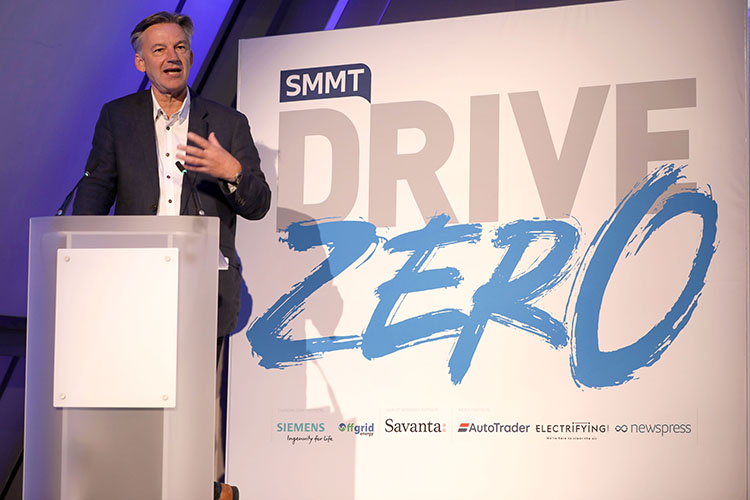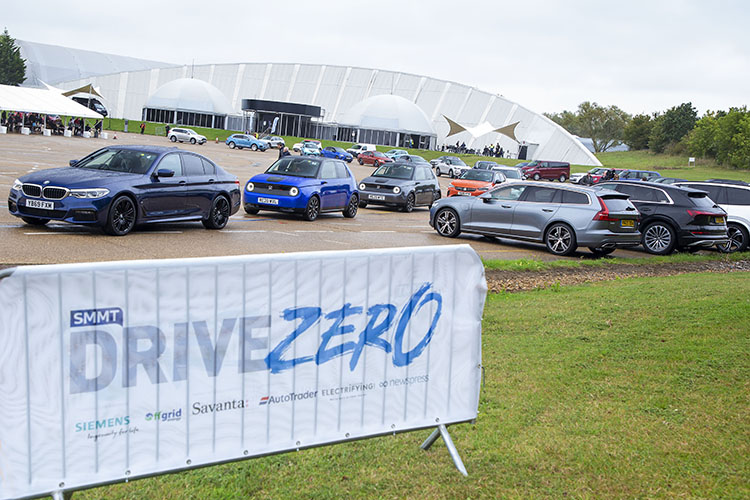Billions invested in electric cars but UK buyers still think 2035 too soon
Billions invested in electric cars but UK buyers still think 2035 too soon
- plarge
- 4th September 2020
- 12:41 pm
- Electric, Emissions, Environment, Event News
Billions invested in electric vehicle range but nearly half of UK buyers still think 2035 too soon to switch
- Huge investment in electric vehicle choice is driving demand, but nearly half of motorists still not ready for a 2035 switch, with higher purchase prices and charging concerns holding buyers back.
- SMMT calls for zero tax on zero emission-capable cars, including plug-in hybrids, alongside long-term commitment to the Plug-in Grant to drive as many as 2.4 million sales in the five years to 2025.
- New analysis reveals at least £16.7bn cost of getting UK’s public charging network ready for mass EV market, with 507 new charge points needed every day to 2035 to drive buyer confidence.
- Car makers create event to boost awareness of EV technologies and set out need for multi-sector strategy with binding commitments on incentives and infrastructure.




Friday 4 September, 2020
The Society of Motor Manufacturers and Traders (SMMT) today called on government to commit to significant long-term incentives for electric vehicle (EV) purchase and binding targets on charging infrastructure, as a new survey1 suggests almost half of UK motorists don’t feel ready to make the switch by 2035. The call was made as more than 20 leading car brands came together at a special EV driving event to highlight the growing range of exciting new technologies already on the market, demonstrating the industry’s commitment to getting Britain’s motorists on the road to zero.
EVs are rapidly growing in popularity, with demand more than doubling over the last year2 thanks to massive industry investment worth some £54 billion in 2019 alone.3 Over the last 12 months, the number of plug-in hybrid and full electric models has leapt from 62 to 83, with more scheduled for launch in the coming months.4 Consumers can now choose from a raft of technologies to suit their driving needs, from plug-in hybrids capable of an average 38 miles’ zero emission driving on a single charge, to full electric models with ranges of up to 300 miles, and hydrogen-electric cars that emit nothing but water.
A new SMMT survey by Savanta ComRes confirms keen interest from consumers in this technology with drivers most attracted to the lower running costs (41%) and chance to improve the environment (29%). However, while these cars now account for one in six models on sale (17%), they make up just one in 13 purchases (8%).5
The survey found the biggest factors holding buyers back are higher purchase prices (52%), lack of local charging points (44%) and fear of being caught short on longer journeys (38%). While, encouragingly, a third (37%) are optimistic about buying a full EV by 2025, 44% don’t think they’ll be ready by 2035, with 24% saying that they can’t ever see themselves owning one.
Despite these reservations, most barriers can be overcome with the right strategy. SMMT is calling for a long-term commitment to incentives, including the continuation of the Plug-in Grant and its re-introduction for plug-in hybrids – a technology critical to the transition, giving higher mileage drivers reassuring flexibility and delivering environmental benefits now.
This commitment, alongside VAT exemptions for all zero emission capable cars, would reduce the upfront price of a family car by an average £5,500 for battery electric cars and £4,750 for plug-in hybrids, and for an SUV by £9,750 and £8,000 respectively – vital given the high cost of producing this advanced new technology. This would bring them more in line with petrol and diesel equivalents and potentially drive some 2.4 million sales over the next five years, with an estimated 28% market share by 2025 compared with 8% today.6
Extensive analysis by SMMT and Frost and Sullivan also shows that a full, zero emission-capable UK new car market will require 1.7 million public charge points by the end of the decade and 2.8 million by 2035. Given there are only some 19,314 on-street charge points today,7 the task is massive, needing 507 on-street chargers to be installed per day until 2035 at a cost of £16.7 billion.
Mike Hawes, SMMT Chief Executive, said
Car makers are leading the charge to zero emission motoring, with massive investment in new models fueling huge consumer interest but they can’t transform the market alone. To give consumers confidence to take the leap into these technologies, we need government and other sectors to step up and match manufacturers’ commitment by investing in the incentives and infrastructure needed to power our electric future.
Manufacturers are working hard to make zero and ultra-low emissions the norm and are committed to working with government to accelerate the shift to net zero – but obstacles remain. Until these vehicles are as affordable to buy and as easy to own and operate as conventional cars, we risk the UK being in the slow lane, undermining industry investment and holding back progress.
Government has already taken significant steps to support this emerging market. Purchase grants worth more than £1.7 billion8 have been paid out or budgets earmarked from 2011 to 2023, alongside £500 million committed to the Project Rapid motorway charging network and a £200 million investment fund for public charging network expansion. However, while welcome, this is a fraction of what is needed to meet ambitious targets. All stakeholders must work together to develop a truly accessible, national network that serves the needs of all road users. SMMT is therefore calling for a national, multi-sector strategy led by government but with binding infrastructure targets, delivered by local authorities, charging providers and energy companies.
The vast range of zero emission-capable vehicles currently available to UK buyers was on display today at a special test drive event hosted at one of the world’s major vehicle test track and development facilities, Millbrook Proving Ground in Bedfordshire. SMMT Drive Zero brought together more than 20 car and van brands, as well as consumers, politicians, government officials and media all keen to get into the latest EV models.
From flexible plug-in hybrids, to full battery electric and hydrogen fuel cell electric vehicles, guests were able to put models in all shapes and sizes, including city run-arounds and family hatches, SUVs, saloons and sports cars, through their paces.9
Key recommendations for a smooth, sustainable transition to zero
1. Government to drive uptake through incentives, including grants for all zero emission-capable vehicles and tax breaks, in place for at least six years.
2. A national strategic plan delivered locally to uplift the number of chargepoints and ensure the right type of chargers are in the right places.
3. Support for local authorities, with guidance on planning permission and technical standards, and a requirement to adhere to national standards.
4. A multi-sector strategy and roadmap with targets for incentives, infrastructure and energy provision, alongside positive consumer messages on all technology choices.
5. All public chargepoints to be available for all users, including rapid and ultra-rapid types, with credit/debit card access and/or network roaming.
6. Progress to be reviewed at regular intervals, with key enabling metrics reported annually to track against plan.
7. A bold strategy to support the UK’s industrial transition, to retain, grow and transform auto manufacturing in the UK and attract new investment, including upskilling the workforce, battery gigafactory investment, supply chain development and strategic R&D investment at a globally competitive level.
Notes to editors
Footnotes
1. Savanta ComRes interviewed 2,185 adults online in the UK, filtering to those who hold a driving licence, between 21-24 August 2020. Data were weighted to be demographically representative of the UK by age, gender, region and social grade. Savanta ComRes is a member of the British Polling Council and abides by its rules www.savanta.com
2. 112.1% growth in registrations of new battery electric and plug-in hybrid cars from Jan-July 2019 to Jan-July 2020, with 39,119 BEVs and 26,955 PHEVs registered in first seven months of 2020: https://www.smmt.co.uk/2020/08/new-car-registrations-up-11-3-as-pent-up-demand-helps-lift-market/
3. Research by Transport & Environment, May 2020 https://www.transportenvironment.org/press/record-%E2%82%AC60bn-investment-electric-cars-and-batteries-europe-secured-last-year
4. SMMT MVRIS data
5. SMMT MVRIS data
6. Modelling and analysis by SMMT, June 2020
7. Zap map count as of 1 September 2020
8. £1.7billion includes grant for cars, vans, taxis and motorcycles: https://www.gov.uk/government/news/plug-in-vehicle-grants-update-following-todays-budget
9. Modelling and analysis by Frost & Sullivan and SMMT, June 2020. NB, in addition to the public charge point requirement (7-22kW), 7,000 150kW chargers at motorway service areas and 8.3 million private residential charge points needed by 2035 to support proposed accelerated end of sale date
10. Vehicles featured at SMMT Drive Zero 2020 with quoted electric range:
Audi E-tron BEV 249 miles
Bentley Bentayga Hybrid All-new 3.0-litre V6 TFSI engine with 128 PS / 126 bhp / 94 kW electric motor-generator (e-machine) PHEV 31 Miles
BMW i3 BEV 182 Miles
BMW 330e MSport PHEV 35 Miles
BMW X5 xDrive45e PHEV 41 Miles
BMW 530e MSport PHEV 21 Miles
Citroen C5 Aircross PHEV 34 Miles
DS 3 Crossback E-Tense BEV 200 Miles
DS 7 Crossback E-Tense PHEV 36 Miles
Ford Kuga PHEV 33 Miles
Ford Mach-E BEV 370 Miles
Ford Tourneo PHEV 31 Miles
Honda e Advance BEV 125 Miles
Hyundai NEXO Premium SE Hydrogen Fuel Cell Electric vehicle 413 Miles
Hyundai Kona Electric Premium SE 64kWh BEV 278 Miles
Hyundai IONIQ Electric Premium SE 64kWh BEV 193 Miles
Jaguar IPACE 90kWh 400PS AWD Automatic BEV 292 Miles
Range Rover Sport 2.0 404 PS PHEV 31 Miles
Kia Soul EV First Edition 64kWh lithium-ion 201bhp 1-speed auto BEV 280 Miles
Kia eNiro ‘4’ 64kWh lithium-ion 201bhp 1-speed auto BEV 282 Miles
LEVC TX Range Extended PHEV 63 Miles
MG ZS EV Exclusive BEV 44.5kWh 163 Miles
MINI Electric BEV 145 Miles
MINI Countryman PHEV 26 Miles
Mitsubishi Outlander PHEV Exceed Auto 2.0 litre PHEV 28 Miles
NISSAN Leaf e+ 62kWh Tekna BEV 239 Miles
Peugeot e-208 BEV 217 Miles
Peugeot e-2008 BEV 193 Miles
Peugeot 3008 PHEV 40 Miles
Renault Twizy Dynamique Automatic BEV 56 Miles
Renault All-New Zoe GT Line R135 Z.E. 50 Automatic BEV 338 Miles
Renault Kangoo Van Z.E. 33 Business Automatic BEV 170 Miles
Renault Master FWD Van Z.E. Business Automatic BEV 124 Miles
Vauxhall Corsa-e BEV 209 Miles
Vauxhall Grandland X Hybrid4 1.6 litre four cylinder turbocharged PHEV 32 Miles
Vauxhall Vivaro-e BEV 143 /205 Miles
Volvo XC40 Recharge Plug-in Hybrid R-Design Pro PHEV 28 miles
Volvo V60 T8 Twin Engine R-Design Plus PHEV 28 miles
Volvo XC90 (PHEV) Recharge Plug-in Hybrid T8 Inscription Pro, Electric range: 28 miles
File Downloads
Drive Zero
Title Description Version Size Hits Date added Download Drive-Zero-6 143.40 KB 292 08-10-2020 DownloadPreview Drive-Zero-5 89.95 KB 287 08-10-2020 DownloadPreview Drive-Zero-4 125.55 KB 306 08-10-2020 DownloadPreview Drive-Zero-2 444.66 KB 291 08-10-2020 DownloadPreview Billions invested in EVs but nearly half of UK buyers think 2035 too soon to switch 105.20 KB 274 08-10-2020 Download
Notes to Editors
About SMMT and the UK automotive industry
The Society of Motor Manufacturers and Traders (SMMT) is one of the largest and most influential trade associations in the UK. It supports the interests of the UK automotive industry at home and abroad, promoting a united position to government, stakeholders and the media.
The automotive industry is a vital part of the UK economy accounting for £82 billion turnover and £18.6 billion value added. With some 168,000 people employed directly in manufacturing and 823,000 across the wider automotive industry, it accounts for 13% of total UK export of goods and invests £3.75 billion each year in automotive R&D. More than 30 manufacturers build some 70 models of vehicle in the UK supported by 2,400 component providers and some of the world’s most skilled engineers.
More detail on UK automotive available in SMMT’s Motor Industry Facts 2019 publication at smmt.co.uk/facts20
Broadcasters
SMMT has an ISDN studio and access to expert spokespeople, case studies and regional representatives.
SMMT media contacts
- Paul Mauerhoff, 020 7344 9233, pmauerhoff@smmt.co.uk
- Daniel Zealander, 020 7344 1667, dzealander@smmt.co.uk
- Aleona Krechetova, 020 7344 9215, akrechetova@smmt.co.uk
- James Boley, 020 7344 9222, jboley@smmt.co.uk
- Emma Butcher, 020 7344 9263, ebutcher@smmt.co.uk

Comments are closed.